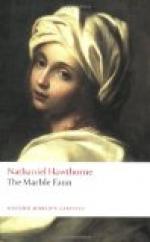Meanwhile, the venerable Englishman and his daughters were staring at poor Hilda in a way that proved them altogether astonished, as well as inexpressibly shocked, by her sudden intrusion into their private balcony. They looked,—as, indeed, English people of respectability would, if an angel were to alight in their circle, without due introduction from somebody whom they knew, in the court above,—they looked as if an unpardonable liberty had been taken, and a suitable apology must be made; after which, the intruder would be expected to withdraw.
The abbate, however, drew the old gentleman aside, and whispered a few words that served to mollify him; he bestowed on Hilda a sufficiently benignant, though still a perplexed and questioning regard, and invited her, in dumb-show, to put herself at her ease.
But, whoever was in fault, our shy and gentle Hilda had dreamed of no intrusion. Whence she had come, or where she had been hidden, during this mysterious interval, we can but imperfectly surmise, and do not mean, at present, to make it a matter of formal explanation with the reader. It is better, perhaps, to fancy that she had been snatched away to a land of picture; that she had been straying with Claude in the golden light which he used to shed over his landscapes, but which he could never have beheld with his waking eyes till he awoke in the better clime. We will imagine that, for the sake of the true simplicity with which she loved them, Hilda had been permitted, for a season, to converse with the great, departed masters of the pencil, and behold the diviner works which they have painted in heavenly colors. Guido had shown her another portrait of Beatrice Cenci, done from the celestial life, in which that forlorn mystery of the earthly countenance was exchanged for a radiant joy. Perugino had allowed her a glimpse at his easel, on which she discerned what seemed a woman’s face, but so divine, by the very depth and softness of its womanhood, that a gush of happy tears blinded the maiden’s eyes before she had time to look. Raphael had taken Hilda by the hand, that fine, forcible hand which Kenyon sculptured,—and drawn aside the curtain of gold-fringed cloud that hung before his latest masterpiece. On earth, Raphael painted the Transfiguration. What higher scene may he have since depicted, not from imagination, but as revealed to his actual sight!
Neither will we retrace the steps by which she returned to the actual world. For the present, be it enough to say that Hilda had been summoned forth from a secret place, and led we know not through what mysterious passages, to a point where the tumult of life burst suddenly upon her ears. She heard the tramp of footsteps, the rattle of wheels, and the mingled hum of a multitude of voices, with strains of music and loud laughter breaking through. Emerging into a great, gloomy hall, a curtain was drawn aside; she found herself gently propelled into an open balcony, whence she looked out upon the festal street, with gay tapestries flaunting over all the palace fronts, the windows thronged with merry faces, and a crowd of maskers rioting upon the pavement below.




